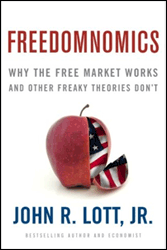
The world of economics is predictably unpredictable; we know that markets will ebb and flow, but not when or often why. So too it goes with John Lott, the undefatigable conservative economist who is guaranteed to pop up in some new controversy of his own creation every so often. What keeps him going—and why places like AEI embrace him—remains a mystery. Lott is most infamous for his claims that crime rates are inversely proportional to rates of gun ownership; or as his book title put it, More Guns, Less Crime. Small problem: His research is far from bulletproof, and he’s been repeatedly exposed and denounced for what could be charitably called sloppy research. In his defense, Lott has blamed “coding errors,” claimed that some of his data have been destroyed, and in his finest moment, created a fictitious online identity to take on his critics. But none of this has slowed him down. For a good rundown of Lott’s sins, see Chris Mooney’s 2003 piece on our website, which shot some more holes into his work. More recently, Lott sued the Freakonomics guys for defamation after they wrote that he had “falsified his results.” A judge threw part of his case out. Now Lott’s firing back with a new book, Freedomnomics, a defense of the free market against “freaky theories,” printed by renowned academic publisher Regnery. Fact checkers, statisticians, and economists, start your BS detectors…
















